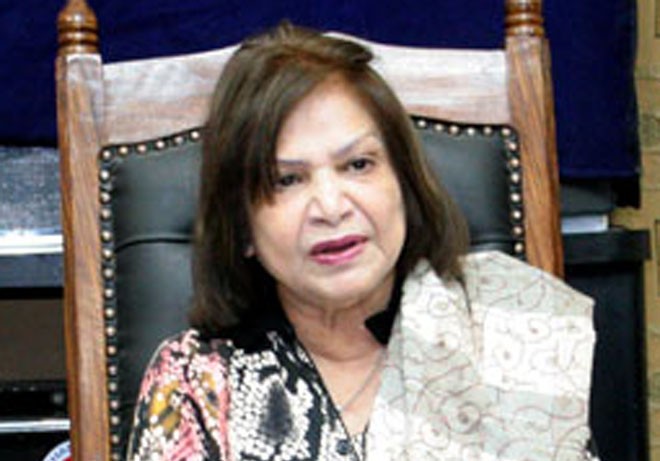
Anis Haroon’s memoirs are a testament to her work as a rights campaigner and political activist

Anis Haroon is a committed human rights activist, political worker and journalist. She has been at the forefront of many a movement for the rights of women. As chairperson of National Commission for the Status of Women, she had introduced quite a few reforms for the betterment of women in the country.
Her lifelong association with varied causes makes for an interesting story with many a lesson. Kab Mehkay Ge Fasl-e-Gul chronicles her life and times -- how she started her life and achieved many milestones. It is also a political document as she joined the Pakistan People’s Party (PPP) in its initial days, worked with Zulfikar Ali Bhutto, thus getting a chance to have a peep into some cataclysmic days of our history. The book must be read as a political biography of those times.
Haroon’s family belonged to Hyderabad Deccan where her father was a class fellow of famous Makhdoom Moheyddin at Nizam College. After the partition of subcontinent in 1947, her family like millions of others landed in Karachi; thus started a period of intense struggle for the family. She was admitted to a school where she found a host of friends with whom she shared her passion for debating. Celebrated poet Fehmida Riaz was her class fellow too and to this day she cherishes her friendship with her.
She narrates how she entered into student politics while in college. It was Ayub Khan’s era and there was general restlessness among students. She became vice president of college union. These activities as a student gave her confidence to move ahead in active politics. She joined the Karachi University and studied International Relations there. She remembers meeting Fatima Jinnah at Mohatta Palace Karachi with her other NSF comrades. After getting another degree in law, she was too wary to opt for law as a profession; instead she started teaching.
When she received an offer to work at the Akhbar-e-Khwateen as an assistant editor, she leapt at it. That was the time when the phenomenon of Bhutto was hugely influencing young people. As he quit Ayub’s cabinet, young people began rallying towards him as they saw in him a redeemer. She joined PPP’s women wing and became close to Nusrat Bhutto due to her fiery speeches.
Here she narrates an incident of questioning the stance of Bhutto on action in Bangladesh. She belonged to Meraj Muhammad Khan group which was a bitter critic of Bhutto’s stance regarding the army action began in the then East Pakistan. Seniors like Meraj Muhammad Khan motivated her to stand up to Bhutto and tell him that his approach was utterly wrong. So, she says, in a meeting of Sindh provincial committee she boldly told Bhutto about her and other comrades’ reservations about the East Pakistan crisis. Bhutto was incensed to hear her point of view and his anger was beyond words. He replied, "You leftists live in an idealist world and you people don’t know the horrible realities of Pakistan. Not only you will get killed but will also get me killed".
Perhaps, the author thinks, Bhutto was in great awe of the Pakistan army; he was to prove right as he was later hanged by army.
Anis Taffazal became Anis Haroon when she met Dr Haroon Ahmad and they got married after they found that they were made to live for each other. In this phase, Anis Haroon describes her struggle on the home-front and what it meant to raise a family for a woman who was always on the move. She briefly narrates how WAF (Woman Action Forum) was launched and what were its guiding principles. There is mention, albeit fleeting, of her constant interaction with leftist intellectual Sibte Hasan and also Faiz Ahmad Faiz.
She got a chance to serve briefly in the caretaker cabinet of Sindh in 2013 and, in that capacity too, she did whatever she could during her short stint. At times, the reader feels as if the writer was in a hurry to finish the book as he would like to read more about many episodes. It also does not read like a memoir; it appears to be an assortment of essays on various aspects of her family and political life. Yet, the book must be read as an account of a courageous lady who made her mark as a rights campaigner and political activist.